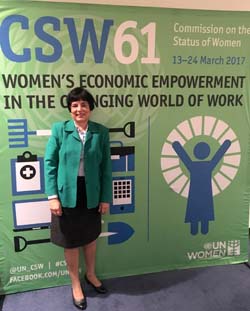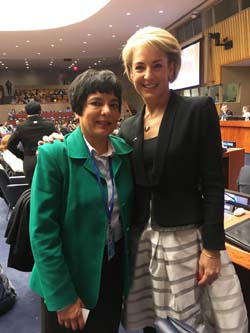Dr Marlene Kanga, President Elect of World Federation of Engineering Organisations (WFEO), highlights the importance of participation in engineering as important to empower women in the future technology-led world of work at the UN Commission on the Status of Women in New York.
On March 13th 2017, the opening day of the Commission on the Status of Women (CSW) at UN Headquarters in New York, the World Federation of Engineering organisations participated in a high level forum organised by UNESCO on the importance of engineering and science in empowering women in a technology-led world of work. This was an important side event that occurred at the same time as the Commission heard submission from member nations on their policies and programs to support ad empower women at work.
Past National President and President Elect of the World Federation of Engineering Organisations, Dr Marlene Kanga AM (photographed below), spoke in March 2017 at a high level forum hosted by UNESCO at the United Nations meetings of the Commission on the Status of Women (CSW61) in New York.

The CSW meetings are the UN’s largest inter-governmental meeting to focus on its impact on women and girls. The meetings are crucial to progressing Goal 5 of the Un Sustainable Development Goals and achieving the 2030 Agenda.
At a town hall meeting, UN Secretary General Antonio Guterres reiterated his commitment to gender parity stating, “The clear objective of our time is parity' rooted in women's empowerment”.
The UNESCO Forum on Women in Engineering focussed on the participation of women in science and engineering. Forum participants includedMinister Susan Shabangu, Minister of Women in the Presidency of South Africa, UN Under-Sectreary General and Executive Director of UN Women, Mrs Phumzile Mlambo-Ngcuka and Mrs. Marie Paule Roudil, the Director of the UNESCO Office in New York.
The UN forum had a particular focus on the economic empowerment of women at work.
Dr Kanga, representing the World Federation of Engineering Organisations, presented on the importance of science technology, engineering and mathematics (STEM) in having an increasingly important role in empowering women to participate in the workplace of the future. It is anticipated that 75 percent of future jobs will require STEM skills. It is vitally important that women recognise the importance of engagement in science and technology ad consider the engineering as a career. These fields should no longer be considered to be “male dominated” but a career pathway for all young people.
Senator Michaelia Cash (photographed below) led a delegation the Australian Government Office for Women and also spoke on the importance of STEM education at the Minister’s Roundtable on “Technology changing the world of work” and how technology and innovation can be harnessed to accelerate women’s economic empowerment.

Other issues that were discussed included progress being made in the Scandinavian countries on the workforce participation of women, the gender pay gap that persists in all countries in the world and the continuing segregation of jobs according to gender. Iceland, which is currently rated first in by the World Economic Forum Gender Equality Index, presented on a session on the gender pay gap and its new legislation to prohibit any differences for similar roles in both the public and private sector.
Event main photo: UN Secretary general at a town hall meeting held during the meetings of the Commission on the Status of Women